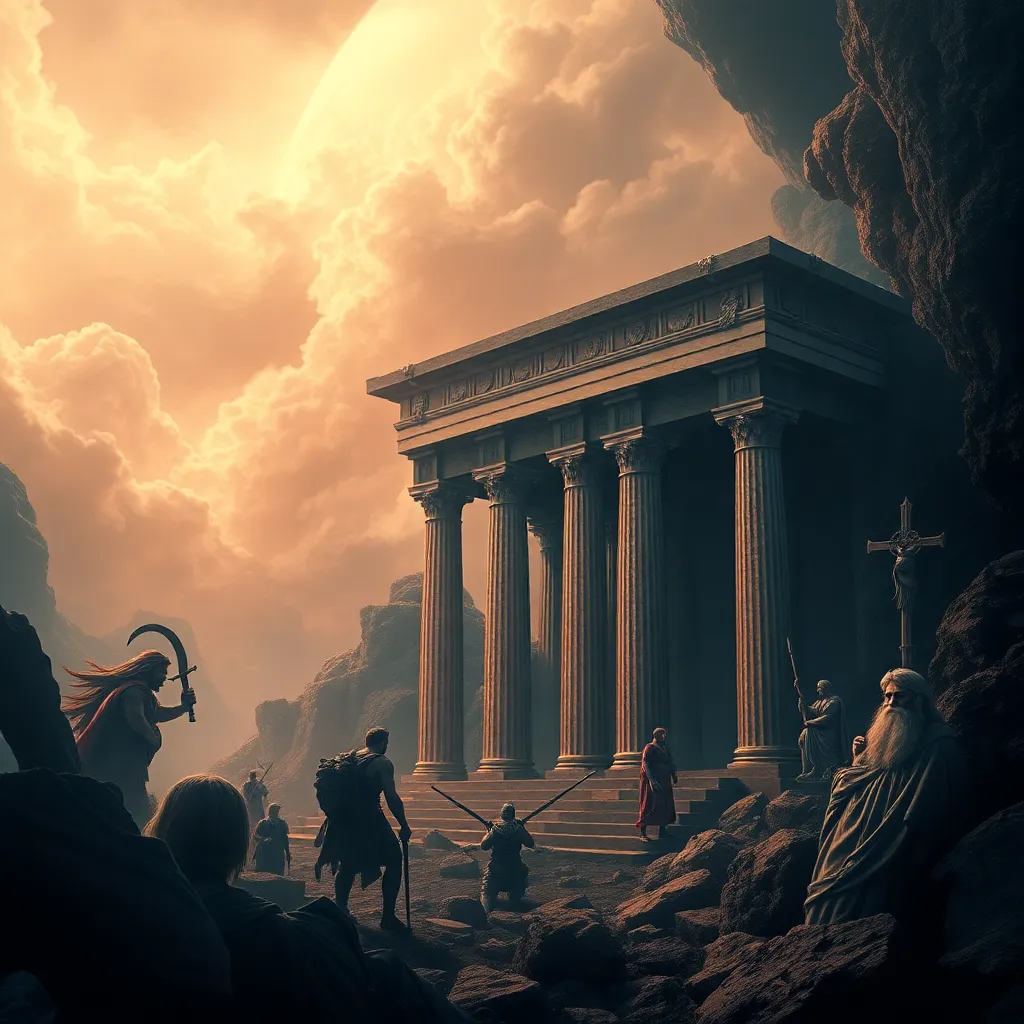The Underworld in the Context of Greek Myths About War and Peace
I. Introduction
The Underworld, known as Hades in Greek mythology, is a complex realm that embodies the afterlife and the fate of souls post-mortem. It serves as a crucial element in the narratives of Greek mythology, particularly in the context of war and peace. Greek myths often revolve around the themes of conflict and resolution, showcasing how these dualities manifest in the lives of mortals and deities alike.
This article explores the intricate relationship between the Underworld and the themes of war and peace, elucidating how Greek mythology uses the Underworld to reflect on the consequences of human actions, particularly in times of strife.
II. The Underworld: Structure and Deities
The Underworld is a multifaceted domain with various realms, each serving a different purpose in the afterlife journey of souls. The primary realms include:
- Hades: The main area where most souls reside, ruled by the god Hades.
- Elysium: A paradise for the virtuous and heroic souls, where peace and happiness abound.
- Tartarus: A deep abyss used as a dungeon of torment for the wicked and as a place of punishment.
Key deities associated with the Underworld include:
- Hades: The god of the Underworld, overseeing the realm of the dead.
- Persephone: The queen of the Underworld, who represents the cycle of life and death.
- Charon: The ferryman who transports souls across the river Styx to the Underworld.
The Underworld plays a pivotal role in the lives of mortals and warriors, acting as the final destination for the souls of those who have engaged in war, reflecting their deeds and legacies.
III. The Underworld as a Reflection of War
Greek myths often highlight the dire consequences of war through the lens of the Underworld. The fateful journeys of notable heroes who descend into the Underworld reveal the emotional and ethical dimensions of conflict:
- Achilles: After his death in battle, Achilles’ spirit ventures into the Underworld, where he expresses regret over the fleeting nature of glory.
- Odysseus: In his journey to consult the prophet Tiresias, Odysseus encounters the souls of fallen warriors, emphasizing the high cost of war.
The concept of honor and legacy is central to these stories, as fallen soldiers are often remembered for their valor, yet they face the harsh realities of their choices in the Underworld. The heroes’ encounters with their past and their reflections on mortality highlight the tragic outcomes of war.
IV. The Underworld’s Role in Promoting Peace
While the Underworld is often associated with the aftermath of war, it also serves as a space for reconciliation and harmony. Several myths illustrate the Underworld’s capacity for fostering peace:
- Persephone’s dual role: As the goddess of spring and queen of the Underworld, Persephone symbolizes the balance between life and death, emphasizing the possibility of renewal and harmony.
- Reconciliation myths: Stories that depict the return of heroes from the Underworld often emphasize forgiveness and the resolution of conflicts.
The Underworld is depicted as a resting place, where souls can find resolution from their earthly struggles, suggesting that even in death, peace can be attained.
V. The Duality of War and Peace in the Underworld
The Underworld embodies a profound duality, reflecting both suffering and tranquility. This coexistence can be seen in the following ways:
- Suffering: Many souls endure punishment or regret for their actions in life, illustrating the pain associated with conflict.
- Tranquility: Conversely, Elysium offers a serene existence for those who have lived honorably, showcasing the potential for peace after turmoil.
Parallels between earthly conflicts and the ultimate fates of souls in the Underworld highlight the cyclical nature of war and peace. Myths suggest that the choices made in life have lasting consequences beyond death, reinforcing the moral implications of human actions.
VI. Cultural Interpretations of the Underworld in War Contexts
Ancient Greek perspectives on death and the afterlife were deeply intertwined with their experiences of warfare. The Underworld influenced various aspects of Greek culture, particularly in literature and art:
- Death and Warfare: The Greeks viewed death in battle as a noble sacrifice, often depicted in their myths and epics.
- Literature and Art: The Underworld was a frequent theme in works such as Homer’s “Iliad” and “Odyssey,” as well as in vase paintings that illustrated heroic tales.
Moreover, modern interpretations of these myths continue to resonate, offering insights into the human condition and the complexities of conflict and resolution.
VII. Lessons from the Underworld: Moral and Philosophical Insights
The myths surrounding the Underworld impart valuable lessons about human nature and the consequences of conflict:
- Human Nature: Myths illustrate the flaws and virtues of humans, showing how pride and ambition can lead to ruin.
- Mortality and Peace: The inevitability of death prompts reflections on the importance of pursuing peace and reconciliation during life.
These moral and philosophical insights from the Underworld resonate in contemporary discussions about war and peace, reminding us of the timeless struggles that define the human experience.
VIII. Conclusion
In summary, the Underworld in Greek mythology serves as a rich tapestry that weaves together the themes of war and peace. Through its structure, deities, and narratives, it reflects the consequences of conflict and the potential for resolution.
The enduring significance of the Underworld lies in its ability to provide profound insights into human nature, morality, and the cyclical nature of life and death. As we explore these ancient myths, we gain a deeper understanding of our own struggles with war and the pursuit of peace.




